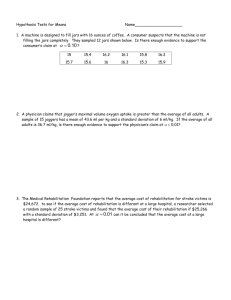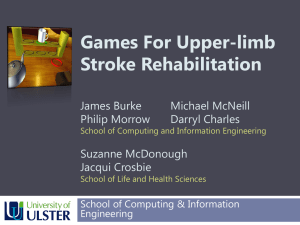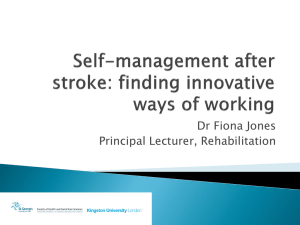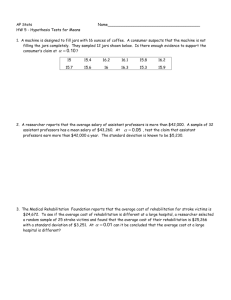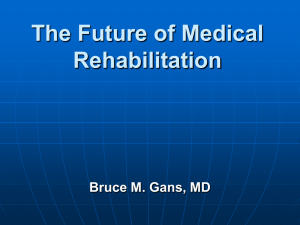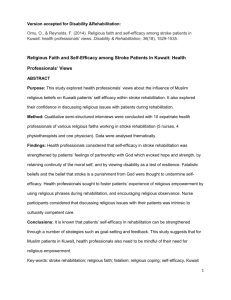0106-08-07
advertisement
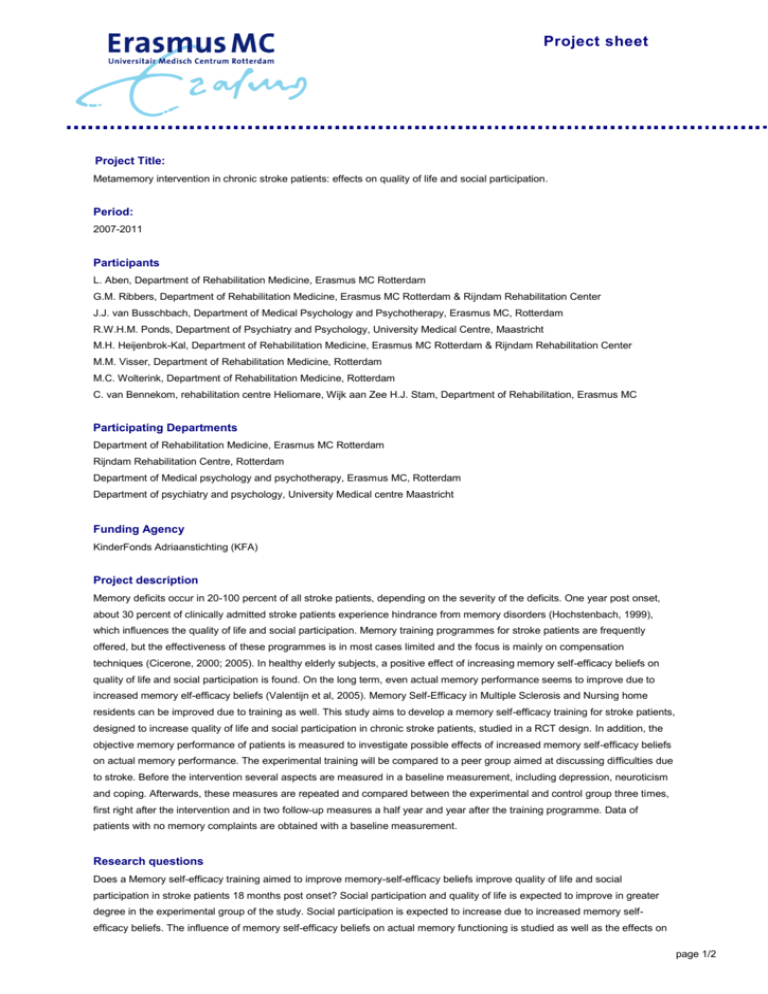
Project sheet Project Title: Metamemory intervention in chronic stroke patients: effects on quality of life and social participation. Period: 2007-2011 Participants L. Aben, Department of Rehabilitation Medicine, Erasmus MC Rotterdam G.M. Ribbers, Department of Rehabilitation Medicine, Erasmus MC Rotterdam & Rijndam Rehabilitation Center J.J. van Busschbach, Department of Medical Psychology and Psychotherapy, Erasmus MC, Rotterdam R.W.H.M. Ponds, Department of Psychiatry and Psychology, University Medical Centre, Maastricht M.H. Heijenbrok-Kal, Department of Rehabilitation Medicine, Erasmus MC Rotterdam & Rijndam Rehabilitation Center M.M. Visser, Department of Rehabilitation Medicine, Rotterdam M.C. Wolterink, Department of Rehabilitation Medicine, Rotterdam C. van Bennekom, rehabilitation centre Heliomare, Wijk aan Zee H.J. Stam, Department of Rehabilitation, Erasmus MC Participating Departments Department of Rehabilitation Medicine, Erasmus MC Rotterdam Rijndam Rehabilitation Centre, Rotterdam Department of Medical psychology and psychotherapy, Erasmus MC, Rotterdam Department of psychiatry and psychology, University Medical centre Maastricht Funding Agency KinderFonds Adriaanstichting (KFA) Project description Memory deficits occur in 20-100 percent of all stroke patients, depending on the severity of the deficits. One year post onset, about 30 percent of clinically admitted stroke patients experience hindrance from memory disorders (Hochstenbach, 1999), which influences the quality of life and social participation. Memory training programmes for stroke patients are frequently offered, but the effectiveness of these programmes is in most cases limited and the focus is mainly on compensation techniques (Cicerone, 2000; 2005). In healthy elderly subjects, a positive effect of increasing memory self-efficacy beliefs on quality of life and social participation is found. On the long term, even actual memory performance seems to improve due to increased memory elf-efficacy beliefs (Valentijn et al, 2005). Memory Self-Efficacy in Multiple Sclerosis and Nursing home residents can be improved due to training as well. This study aims to develop a memory self-efficacy training for stroke patients, designed to increase quality of life and social participation in chronic stroke patients, studied in a RCT design. In addition, the objective memory performance of patients is measured to investigate possible effects of increased memory self-efficacy beliefs on actual memory performance. The experimental training will be compared to a peer group aimed at discussing difficulties due to stroke. Before the intervention several aspects are measured in a baseline measurement, including depression, neuroticism and coping. Afterwards, these measures are repeated and compared between the experimental and control group three times, first right after the intervention and in two follow-up measures a half year and year after the training programme. Data of patients with no memory complaints are obtained with a baseline measurement. Research questions Does a Memory self-efficacy training aimed to improve memory-self-efficacy beliefs improve quality of life and social participation in stroke patients 18 months post onset? Social participation and quality of life is expected to improve in greater degree in the experimental group of the study. Social participation is expected to increase due to increased memory selfefficacy beliefs. The influence of memory self-efficacy beliefs on actual memory functioning is studied as well as the effects on page 1/2 coping style and use of care. The prognostic variables taken into account in this study are demographic variables like age, gender, education and marital status. Size and location, as well as type of stroke are taken into account. There will be adjusted for aphasia and executive disorders. Inclusion criteria - First and only stroke - Reported memory complaints (only by the patient) - Between 18 and 80 years of age - Living independently - Sufficiently capable to participate in group meetings in a rehabilitation centre Exclusion criteria - Progressive neurological disorders like Multiple Sclerosis or dementia - Insufficient knowledge and understanding of the Dutch language - Excessive drug and alcohol use - Subarachnoid and subdural hematoma This study is registered at the Dutch Trial register NTR (TC 1656) Name and date page 2/2


